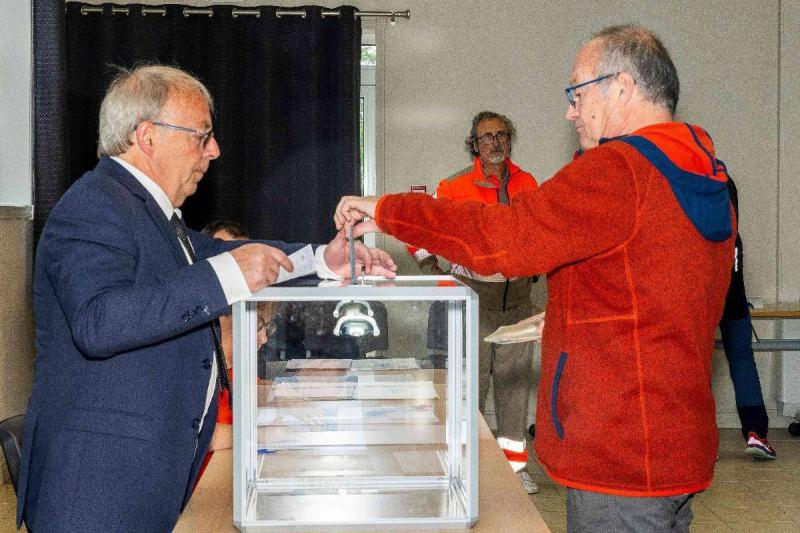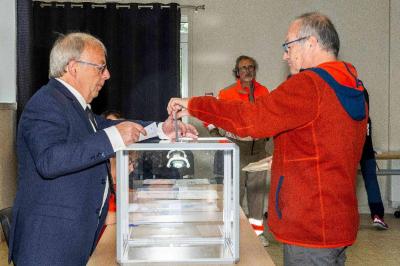Today, Sunday, the French are casting their votes in the first round of early legislative elections called by President Emmanuel Macron, amidst tense atmosphere, due to the implications that the French elections are likely to have. These elections occur after the far-right's victory in the European Parliament elections held from June 6 to June 9.
The expected outcomes of the French elections, with the second round scheduled for July 7, range from the possibility of the far-right gaining control of the government for the first time in this country's history since World War II and the Vichy government, to entering France into a highly complex constitutional crisis if no political force achieves a sufficient majority to assume the presidency of the government in a semi-presidential system. While this system grants the president significant powers, it also reserves an important role for the prime minister and cabinet members, alongside a parliament that has its own authoritative role in government oversight and legislative functions.
In the wake of an exceptional election campaign that lasted only three weeks (Macron had called for the elections immediately after the European election results were announced), it seems likely that through this round, the French will reaffirm what they had previously expressed in the European Parliament elections: anger towards Macron's policies and a desire to punish him again by further undermining his parliamentary majority, just three years before the end of his second presidential term in 2027. This scenario could force him into a difficult coexistence with a far-right prime minister, likely Jordan Bardella, the head of the National Rally party (Marine Le Pen’s party), if predictions hold and if the republican political spectrum and voters do not rally behind the left-wing coalition candidates in the second round.
One potential scenario is that the far-right could win an absolute majority in parliament, meaning 289 seats. These elections, which caught both the French public and the political class off guard, followed the highly negative results achieved by Macron's party, "La République En Marche!", and its allies in the European elections, where they fell to third place (around 15%) on the political map, behind the National Rally, which made significant gains and topped the ranks (around 37% if combined with the second party, Reconquête), alongside revived left-wing forces that took second place after a period of decline and decided to form a broad front in the early French elections to block far-right rule.
Macron had hoped that, by deciding to dissolve the National Assembly (the Parliament) and call for these early elections, he would provoke an awakening among the French to reassess their views and recognize the gravity of allowing the far-right to govern for the first time in the history of the Fifth Republic (since 1958), avoiding a scenario of coexistence with this extreme political force. Macron argued that dissolving Parliament was necessary to clarify the political picture of the country, while disregarding the deep public rejection of his person and policies. He believed that what voters expressed in the European elections was merely a passing rage or an error that could be corrected, which is contradicted by polls showing that the far-right's support in the legislative elections is nearly the same as the voting intentions it received on June 9.
According to the latest polls leading up to this first electoral round, it is likely that the 45.5 million voters, who are expected to turn out exceptionally high at rates between 66% and 68%, will replicate their responses from the European elections, placing the National Rally, led by Jordan Bardella and Marine Le Pen (who plans to run again for the presidency in three years), at the forefront of political forces with around 35% of the votes. The left-wing coalition, the New Popular Union, which comprises various leftist forces including socialists, radical left, communists, and environmental supporters, is projected to retain second place with a share of 29.5% of the votes according to polls, surpassing the President’s party coalition (Together for France), which is expected to receive no more than 20% of the votes.
If these predictions hold for the second electoral round, it would mean that the far-right could secure between 210 and 250 seats out of a total of 577 seats in the French parliament. The leftist coalition is forecasted to win between 180 and 220 seats, while the number of deputies from Macron's pro-republic list would drop to between 65 and 110 seats. Meanwhile, the historically Gaullist right-wing party, The Republicans, is expected to continue its decline, potentially ending up with between 25 and 35 seats, according to polling forecasts, after its leader Éric Ciotti allied with the far-right. The remaining seats will be distributed among smaller parties.




